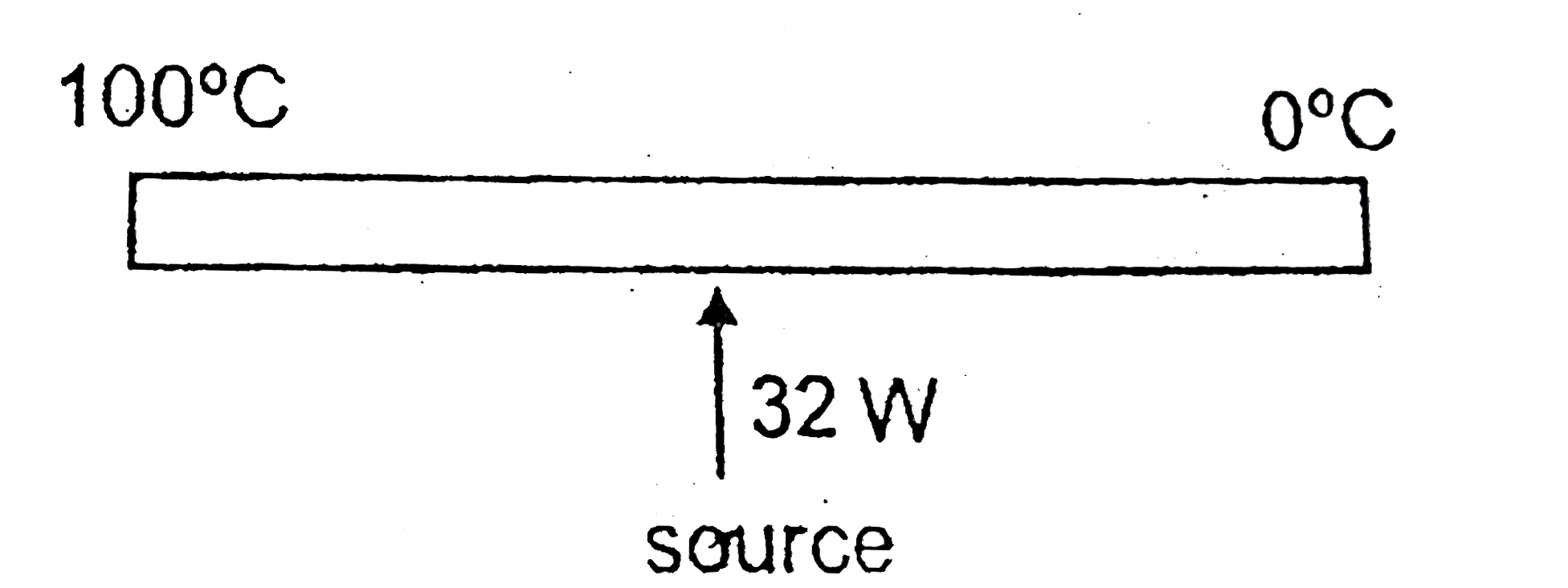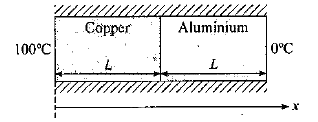A thin copper rod of uniform cross section A square metres and of length L metres has a spherical metal sphere of radius r metre at tis one end symmetrically attached to the copper rod. The thermal conductivity of copper is K and the emissivity of the spherical surface of the sphere is ε.The free end of the copper rod is maintained at the temperature T kelving by supplying thermal energy from a P watt source. Steady state conditions are allowed ot be established while the rod is properly insulated aginst heat loss from its lateral surface. Surroundings are at 0∘C Stefan's constant=σW/m2K4.
After the steady state conditions are reached,the temperature of the spherical end of the rod, TS is
TS=T−PLKA
TS=0∘C
TS=PLKA
TS=T−P(L+r)KA
The correct Answer is:D

The distance from the end A of the copper rod (where power is supplied) and centre O of the metal sphere is (L+r). Hence , in the steady state condions,
P=KA(T−TS)L+r
Which gives TS=T−P(L+r)KA
(The heat is trainsmitted up to centre of the spherical end and the sphere loses energy by radiation out of its spherical surface.)
Topper's Solved these Questions
- BOOK - CENGAGE PHYSICSCHAPTER - CALORIMETRYEXERCISE - Integer8videos
CALORIMETRY
- BOOK - CENGAGE PHYSICSCHAPTER - CALORIMETRYEXERCISE - Solved Example13videos
CALORIMETRY
- BOOK - CENGAGE PHYSICSCHAPTER - CALORIMETRYEXERCISE - Multiple Correct25videos
CALORIMETRY
- BOOK - CENGAGE PHYSICSCHAPTER - BASIC MATHEMATICSEXERCISE - Exercise 2.620videos
BASIC MATHEMATICS
- BOOK - CENGAGE PHYSICSCHAPTER - CENTRE OF MASSEXERCISE - INTEGER_TYPE1videos
CENTRE OF MASS
Similar Questions
The thermal conductivity of copper is four times that of brass. Two rods of copper and brass of same length and cross-section are joined end to end. The free end of copper rod is at 0∘C and that of brass rod at 100∘C. Calculate the temperature of junction at equilibrium. neglect radiation losses.
View Solution" A metal rod of area of cross section A has length L and coefficient of thermal conductivity K The thermal resistance of the rod is "
View Solution
Knowledge Check
- Question 1 - Select One
A thin copper rod of uniform cross section A square metres and of length L metres has a spherical metal sphere of radius r metre at tis one end symmetrically attached to the copper rod. The thermal conductivity of copper is K and the emissivity of the spherical surface of the sphere is ε.The free end of the copper rod is maintained at the temperature T kelving by supplying thermal energy from a P watt source. Steady state conditions are allowed ot be established while the rod is properly insulated aginst heat loss from its lateral surface. Surroundings are at 0∘C Stefan's constant=σW/m2K4.
If the metal sphere attached at the end of the copper rod is made of brass, whose thermal conductivity is Kb<K, then which of the following statements is true?AThe temperature of the sphere will, under steady state conditions, continue to be TBBThe power that will be radiated out from the sphere will still be PS.CIt will take smaller time for steady state conditions to be reachedDThe rate of thermal energy transmitted across the copper rod, under steady state, will reduced. - Question 2 - Select One
A thin copper rod of uniform cross section A square metres and of length L metres has a spherical metal sphere of radius r metre at tis one end symmetrically attached to the copper rod. The thermal conductivity of copper is K and the emissivity of the spherical surface of the sphere is ε.The free end of the copper rod is maintained at the temperature T kelving by supplying thermal energy from a P watt source. Steady state conditions are allowed ot be established while the rod is properly insulated aginst heat loss from its lateral surface. Surroundings are at 0∘C Stefan's constant=σW/m2K4.
The net power that will be radiated out, PS from the sphere after steady state condition are reached isAPS=PBPS=PA4πr2CPS=0DPS=σεT4S - Question 3 - Select One or More
The ends of copper rod of length 1m and area of cross section 1cm2 are maintained at 0∘C and 100∘C. At the centre of rod, there is a source of heat of 32W. The thermal conductivity of copper is 400W/mK
 AThe temperature of rod at centre is 250∘CBThe temperature of rod at centre is 50∘CCThe temperature gradient in right half is 500∘C/mDThe temperature gradient in left half is 300∘C/m
AThe temperature of rod at centre is 250∘CBThe temperature of rod at centre is 50∘CCThe temperature gradient in right half is 500∘C/mDThe temperature gradient in left half is 300∘C/m
A composite rod of uniform cross-section has copper and aluminium sections of the same length in good thermal contact. The ends of the rod, which is well-lagged, are maintained at 100∘C and at0∘C as shown in the diagram (Figure-4.33). The thermal conductivityof copper is twice that of aluminium.
Which one of the following graphs represents the variation of temperature T with x along the rod in the steady state ?
 View Solution
View SolutionA metal rod of area of cross section A has length L and coefficient of thermal conductivity K the thermal resistance of the rod is .
View SolutionThe dimensions of lKA are (l is the length of rod, K is the thermal conductivity of rod and A is the area of cross-section of rod)
View SolutionThe ends of a rod of uniform thermal conductivity are maintained at different (constant) temperatures. Afer the steady state is achieved:
View SolutionA cylindrical steel rod of length 0.10 m and thermal conductivity 50W.m−1K−1 is welded end to end to copper rod of thermal conductivity 400W.m−1.K−1 and of the same area of cross section but 0.20 m long. The free end of the steel rod is maintained at 100∘C and that of the copper and at 0∘C. Assuming that the rods are perfectly insulated from the surrounding, the temperature at the junction of the two rods–
View Solution

